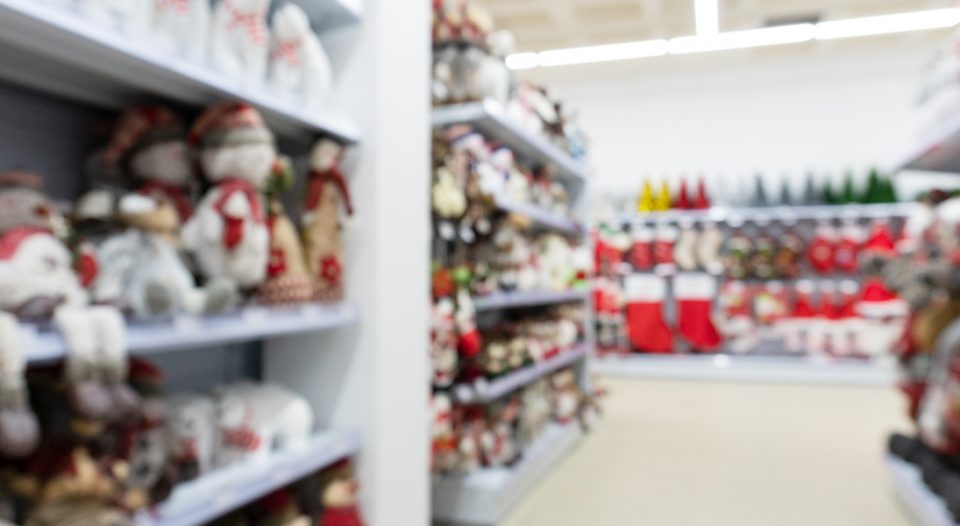When I worked at a department store over my winter breaks in college, I was often assigned to the holiday goods department: a swath of shelves and floor displays of Christmas lights, ornaments and trees. As I stood at my cash register, ready to ring up purchases, a sign from the outdoor décor section stared back at me: “Don’t Forget! Jesus Is the Reason for the Season.”
At first, the fact that this sign was available for purchase seemed like an indictment of every aspect of a late 20th-century American Christmas. Did we really need to buy something to remind us to be more thoughtful about buying things? Eventually, the more I lived with the sign, the more it came to seem like a still, small voice for restraint, completely overridden by the continuous blast of Christmas songs over the store’s PA system. And now, when I look back on it from a distance of 20-some years, the sign seems to have been, well, wrong.
OK, not wrong. Jesus is the reason for the season, the light at the center of every Christian’s celebration, who fills up our dark winter days. But if not wrong, perhaps the sign and its well-meaning sentiment are misguided, an ungenerous way of considering how we might best spend our time at Advent and Christmas. This year, during the COVID-19 pandemic, I’d like to be more generous in how I make Jesus the reason for this season.
Those of us who usually gather with friends, family, colleagues and fellow church members during Christmastime have difficult choices ahead of us to keep ourselves and others safe. As those choices are fretted over, I’ve begun to see a narrative emerging on social media, best summed up in a post I saw on Facebook: “The first Christmas was pretty simple, too. You’ll be OK.”
I like the sentiment. I shared the post. I think it’s correct. But days later, I felt the same sort of discomfort I’d occasionally felt over that sign in the department store: that I’d been chastised. That, left to my own devices, I’d forget. That we are supposed to feel shame for wanting the Christmas we’re used to, a Christmas of abundance, a Christmas that involves more wrapping paper and cookies and tinsel and Gene Autry than that first Christmas.
Jesus is our hope and consolation in this strange time. Let us find new ways to show his love to each other.
To be honest, I could do with a little less Gene Autry, since my days at the store involved hearing his “Rudolph the Red-nosed Reindeer” all day long. And of course, fewer cookies and less waste and reduced excess would be good, too.
But it’s important to recognize that much of what we love about the Christmas season isn’t extraneous, wanton waste—it’s the ways we’ve found to make love manifest. Gifts given, treats baked, visits made, trips taken, all to show how full of love we feel for our friends and family but also for strangers who will benefit from our gifts of time, talent and treasure. These, too, will be curtailed this pandemic Christmas season, and as much as we might appreciate how simplicity can focus us, we can also miss these pleasures, the delights of loving and being loved.
So, let us sometimes be sad this Advent and Christmas for the ways we won’t be able to celebrate. I’m mourning my traditions―there will be no New Year’s trip to visit my best friend in Brooklyn for a few days, no walk through my city’s shopping district and, saddest of all, no in-person Christmas Eve service of candles and carols, which provide some of the most mysterious and beautiful moments of my year.
My eyes well up when I think that a whole year will pass before I experience those moments again, even as I remember that millions of people around the world will miss more than candles and train rides. They’ll miss those they’ve lost; the jobs they no longer hold; the health they can no longer count on. These, too, are things to mourn. And so is the awareness that, for plenty of people, Christmas is always a sad and lonely holiday.
For Christians, Jesus is our hope and consolation in this strange time. So let us find new ways to show his love to each other, even if they’re only temporary fixes we may abandon when we can travel to see each other and hug safely. Cookies can be dropped off at doorsteps. Local cafes can be supported with a generous takeout order and an even more generous tip. Small businesses will ship their goods to someone we love. With our support, organizations can provide food for those who lack it. The internet will allow us visits and church services. This season will be different, but if we will let it, it can still be a season suffused with love.
Don’t forget.




